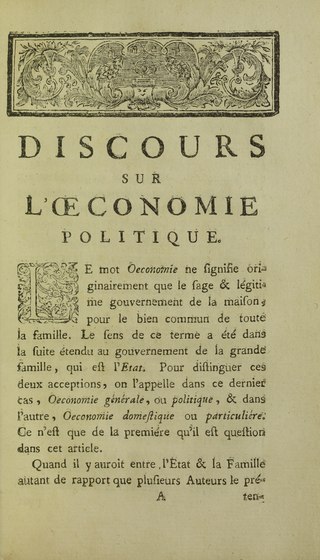
Political economy is a branch of political science and economics studying economic systems and their governance by political systems. Widely studied phenomena within the discipline are systems such as labour markets and financial markets, as well as phenomena such as growth, distribution, inequality, and trade, and how these are shaped by institutions, laws, and government policy. Originating in the 16th century, it is the precursor to the modern discipline of economics. Political economy in its modern form is considered an interdisciplinary field, drawing on theory from both political science and modern economics.
In economics, industrial organization is a field that builds on the theory of the firm by examining the structure of firms and markets. Industrial organization adds real-world complications to the perfectly competitive model, complications such as transaction costs, limited information, and barriers to entry of new firms that may be associated with imperfect competition. It analyzes determinants of firm and market organization and behavior on a continuum between competition and monopoly, including from government actions.
Public choice, or public choice theory, is "the use of economic tools to deal with traditional problems of political science". Its content includes the study of political behavior. In political science, it is the subset of positive political theory that studies self-interested agents and their interactions, which can be represented in a number of ways – using standard constrained utility maximization, game theory, or decision theory. It is the origin and intellectual foundation of contemporary work in political economy.

New Keynesian economics is a school of macroeconomics that strives to provide microeconomic foundations for Keynesian economics. It developed partly as a response to criticisms of Keynesian macroeconomics by adherents of new classical macroeconomics.
Monetary economics is the branch of economics that studies the different theories of money: it provides a framework for analyzing money and considers its functions, and it considers how money can gain acceptance purely because of its convenience as a public good. The discipline has historically prefigured, and remains integrally linked to, macroeconomics. This branch also examines the effects of monetary systems, including regulation of money and associated financial institutions and international aspects.

Law and economics, or economic analysis of law, is the application of microeconomic theory to the analysis of law, which emerged primarily from scholars of the Chicago school of economics. Economic concepts are used to explain the effects of laws, to assess which legal rules are economically efficient, and to predict which legal rules will be promulgated. There are two major branches of law and economics; one based on the application of the methods and theories of neoclassical economics to the positive and normative analysis of the law, and a second branch which focuses on an institutional analysis of law and legal institutions, with a broader focus on economic, political, and social outcomes, and overlapping with analyses of the institutions of politics and governance.
Agricultural economics is an applied field of economics concerned with the application of economic theory in optimizing the production and distribution of food and fiber products. Agricultural economics began as a branch of economics that specifically dealt with land usage. It focused on maximizing the crop yield while maintaining a good soil ecosystem. Throughout the 20th century the discipline expanded and the current scope of the discipline is much broader. Agricultural economics today includes a variety of applied areas, having considerable overlap with conventional economics. Agricultural economists have made substantial contributions to research in economics, econometrics, development economics, and environmental economics. Agricultural economics influences food policy, agricultural policy, and environmental policy.
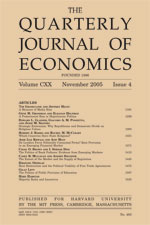
The Quarterly Journal of Economics is a peer-reviewed academic journal published by the Oxford University Press for the Harvard University Department of Economics. Its current editors-in-chief are Robert J. Barro, Lawrence F. Katz, Nathan Nunn, Andrei Shleifer, and Stefanie Stantcheva.

Abraham "Abba" Ptachya Lerner was a Russian-born American-British economist.
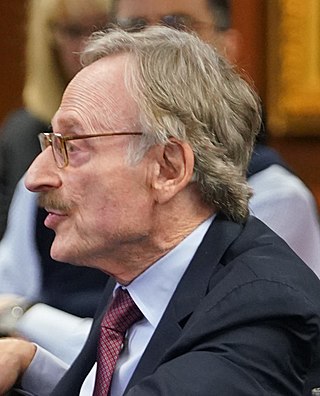
Michael Jay Boskin is the T. M. Friedman Professor of Economics and senior Fellow at Stanford University's Hoover Institution. He also is chief executive officer and president of Boskin & Co., an economic consulting company.
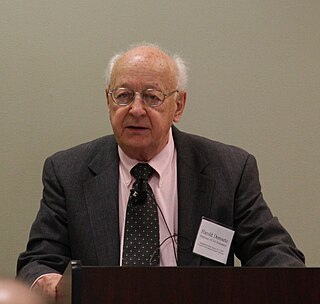
Harold Demsetz was an American professor of economics at the University of California at Los Angeles (UCLA).
Regional economics is a sub-discipline of economics and is often regarded as one of the fields of the social sciences. It addresses the economic aspect of the regional problems that are spatially analyzable so that theoretical or policy implications can be the derived with respect to regions whose geographical scope ranges from local to global areas.

Immigration is the international movement of people to a destination country of which they are not natives or where they do not possess citizenship in order to settle as permanent residents or naturalized citizens. Commuters, tourists, and other short-term stays in a destination country do not fall under the definition of immigration or migration; seasonal labour immigration is sometimes included, however.
Applied economics is the study as regards the application of economic theory and econometrics in specific settings. As one of the two sets of fields of economics, it is typically characterized by the application of the core, i.e. economic theory and econometrics to address practical issues in a range of fields including demographic economics, labour economics, business economics, industrial organization, agricultural economics, development economics, education economics, engineering economics, financial economics, health economics, monetary economics, public economics, and economic history. From the perspective of economic development, the purpose of applied economics is to enhance the quality of business practices and national policy making.
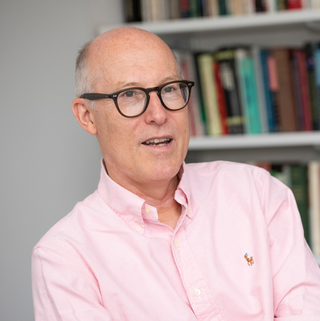
Sir Timothy John Besley, is a British academic economist who is the School Professor of Economics and Political Science and Sir W. Arthur Lewis Professor of Development Economics at the London School of Economics (LSE).
Public economics(or economics of the public sector) is the study of government policy through the lens of economic efficiency and equity. Public economics builds on the theory of welfare economics and is ultimately used as a tool to improve social welfare. Welfare can be defined in terms of well-being, prosperity, and overall state of being.
Demographic economics or population economics is the application of economic analysis to demography, the study of human populations, including size, growth, density, distribution, and vital statistics.
The American Economic Journal is a group of four peer-reviewed academic journals published by the American Economic Association. The names of the individual journals consist of the prefix American Economic Journal with a descriptor of the field attached. The four field journals which started in 2009 are Applied Economics, Economic Policy, Macroeconomics, and Microeconomics.
Robert Eisner was an American author and William R. Kenan professor of economics at Northwestern University. He was recognized throughout the United States for his expertise and knowledge of macroeconomics and the economics of business cycles. He was a regular contributor to the Wall Street Journal, The New York Times, Chicago Tribune, and The Los Angeles Times, primarily covering national economic policy and reform.









